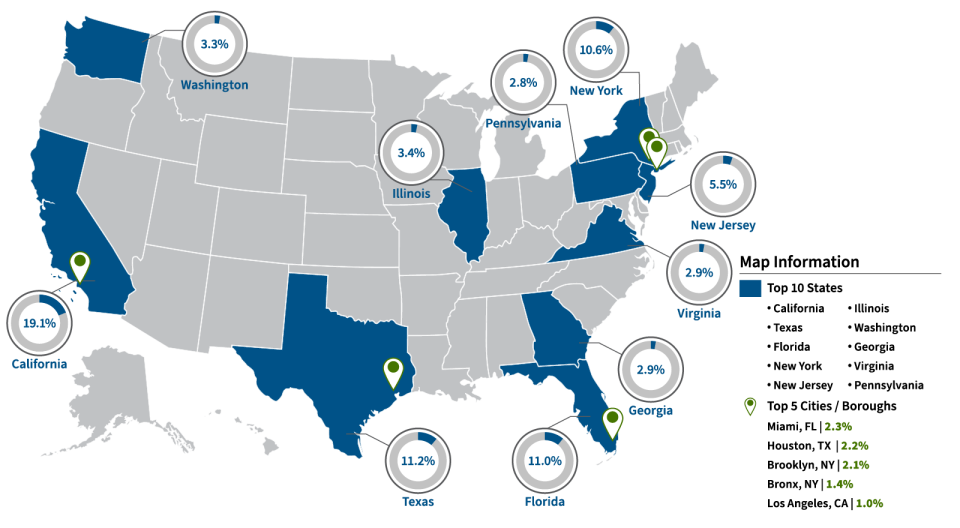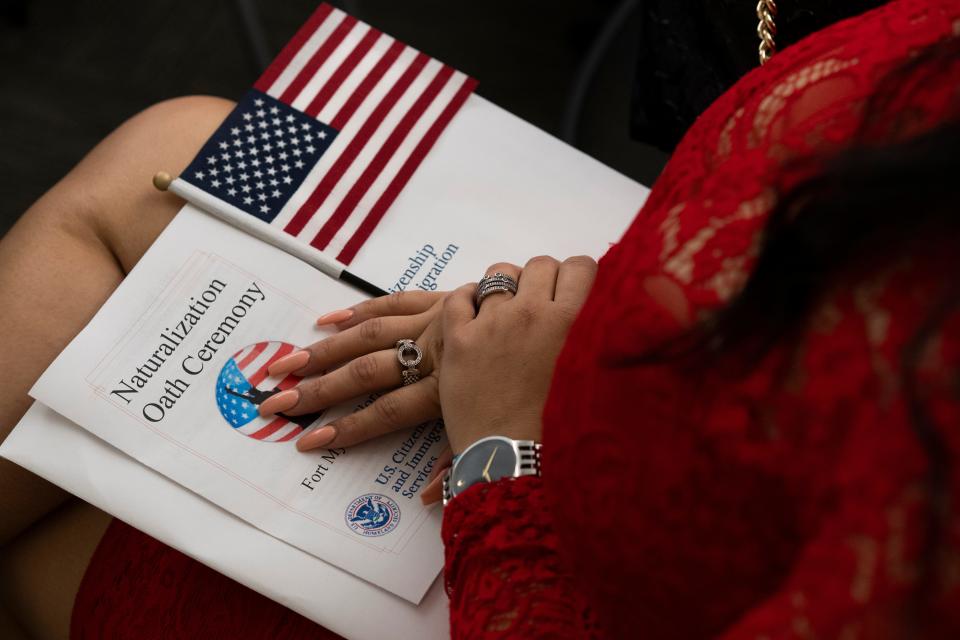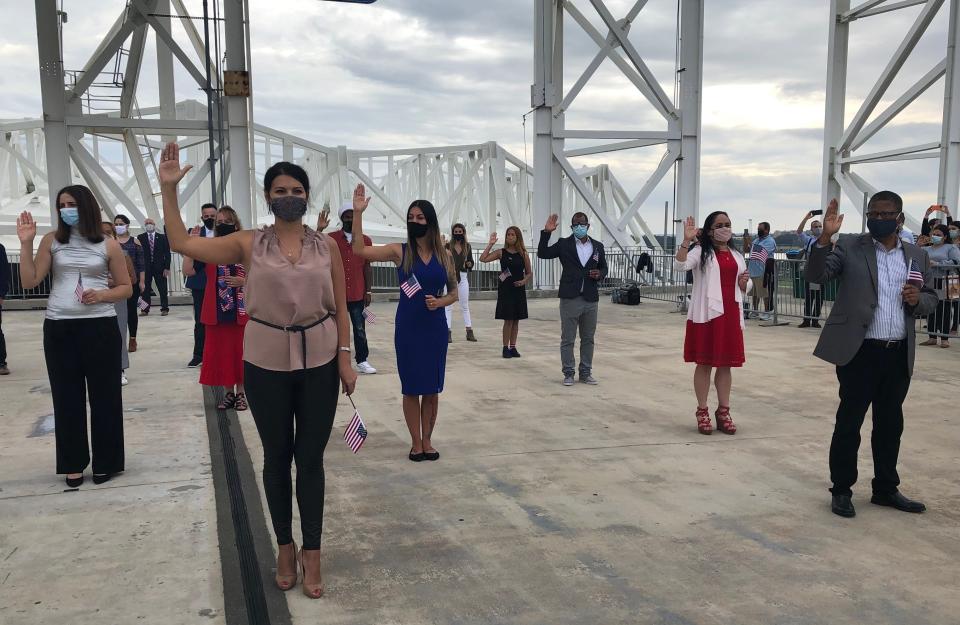How do you become a US citizen? How many in Florida take the exam? What you should know
As the U.S. continues to tackle the issue of immigration, Florida took a tough stance.
A Florida law known as Senate Bill 1718, backed by Republican Gov. Ron DeSantis, went into effect July 1. It imposes some of the nation’s toughest penalties and new restrictions on undocumented immigrants, forcing many to decide whether to leave the country.
But there is another alternative that thousands choose every year: becoming a U.S. citizen.
It's a process that takes time but brings with it several rights and responsibilities.
Why should you become a US citizen?
According to the U.S. Citizenship and Immigration Services, citizens can:
Vote. Only citizens can vote in federal elections. Most states also restrict the right to vote, in most elections, to U.S. citizens.
Serve on a jury. Only U.S. citizens can serve on a federal jury. Most states also restrict jury service to U.S. citizens. Serving on a jury is an important responsibility for U.S. citizens.
Travel with a U.S. passport. A U.S. passport enables you to get assistance from the U.S. government when overseas.
Bring family members to the U.S. U.S. citizens generally get priority when petitioning to bring family members permanently to this country.
Obtain citizenship for children under 18 years of age. In most cases, a child born abroad to a U.S. citizen is automatically a U.S. citizen.
Apply for federal jobs. Certain jobs with government agencies require U.S. citizenship.
Become an elected official. Only citizens can run for federal office (U.S. Senate or House of Representatives) and for most state and local offices.
Keep your residency. A U.S. citizen’s right to remain in the United States cannot be taken away.
Become eligible for federal grants and scholarships. Many financial aid grants, including college scholarships and funds given by the government for specific purposes, are available only to U.S. citizens.
Obtain government benefits. Some government benefits are available only to U.S. citizens.
What is the difference between citizenship and naturalization?
Citizenship is granted at birth, while naturalization is a process that confers citizenship.
To be naturalized is the process in which a person not born in the United States voluntarily becomes a U.S. citizen.
How many people became U.S. citizens in 2022 and how many have been naturalized so far in 2023?
In fiscal year 2022, which runs from October 2021 to August 2022, there were 970,000 new citizens. It's the highest number of naturalized citizens in almost 15 years, according to Sharon Scheidhauer, spokesperson, U.S. Citizenship and Immigration Services.
The offices that have naturalized the largest number of new citizens in 2022 were: Houston (4.8%); Newark (4.5%); San Francisco (3.9%); Dallas (3.7%); and Chicago (3.3%).
As of June 7, there have been 588,900 new U.S. citizens in 2023.
Where do most new US citizens come from?
Among the top five countries of birth for people naturalizing in fiscal 2022, Mexico was the lead country, with 13.3% of all naturalizations, followed by India (6.8%), the Philippines (5.5%), Cuba (4.8%), and the Dominican Republic (3.6%).
Those five countries made up 34% of the naturalized citizens in fiscal 2022.
Number of naturalized U.S. citizens in fiscal 2022 by country of birth:
Mexico: 128,300
India: 65,800
Philippines: 53,300
Cuba: 46,700
Dominican Republic: 34,400
China: 32,700
Vietnam: 23,200
Jamaica: 22,800
El Salvador: 21,300
Colombia: 18,000
Florida comes in third with the most new citizens in 2022

Of all citizens naturalized in fiscal year 2022, 73% resided in 10 states, with California topping the country. More than 41% resided in the top three states.
Top 10 states with approved naturalizations:
California: 184,700
Texas: 108,300
Florida: 106,000
New York: 102,300
New Jersey: 53,700
Illinois: 32,800
Washington: 32,100
Georgia: 28,400
Virginia: 27,600
Pennsylvania: 27,000
The top five cities where people who were naturalized lived were (in descending order): Miami (2.3%); Houston (2.2%); Brooklyn (2.1%); the Bronx (1.4%); and Los Angeles (1.0%).
Approved naturalizations for fiscal 2022 in the top 10 cities/boroughs:
Miami: 22,300
Houston: 20,800
Brooklyn: 20,200
Bronx: 13,900
Los Angeles: 9,300
San Jose: 9,000
New York: 8,500
Chicago: 8,400
Las Vegas: 7,700
Hialeah: 6,800
10 steps to naturalization, becoming a U.S. citizen
The following is a general description of the naturalization process. There are exceptions and accommodations and Citizenship and Immigration Services has more details on its website.
Determine if you are already a U.S. citizen
Determine if you are eligible to become a U.S. citizen
Prepare your Form N-400, Application for Naturalization
Submit your Form N-400 and pay your fees
Go to your biometrics appointment, if applicable
Complete the interview
Receive a decision from USCIS on your Form N-400
Receive a notice to take the Oath of Allegiance
Take the Oath of Allegiance to the United States
Understanding U.S. citizenship
How many people pass the naturalization test?
Almost 95% — 94.8% — of all applicants pass the naturalization test, according to Scheidhauer.
Who is eligible to be naturalized?
To be eligible for naturalization, an applicant must fulfill certain eligibility requirements set forth in the Immigration and Nationality Act.
In general, a noncitizen must spend at least five years as a lawful permanent resident to be eligible for naturalization while a spouse of a U.S. citizen must spend at least three years as a lawful permanent resident.
Most people who naturalized came to the United States as immediate relatives of U.S. citizens or through family-sponsored preference categories, followed by refugees and asylees, employment-based preference categories, and the Diversity Immigrant Visa Program.
What is the difference between naturalized citizenship and birthright citizenship?
Birthright citizenship means that anyone born in a country is automatically a citizen of that country. Such people are called "natural citizens" and do not have to take extra steps to become a U.S. citizen. Birthright citizenship is enshrined in the 14th Amendment to the U.S. Constitution.
How much does it cost to become a U.S. citizen?
The fee to file the Application for Naturalization, Form N-400 is $640 plus an $85 biometric fee for a total of $725.
The Immigration Service will approve a fee waiver only if the applicant clearly demonstrates that they are unable to pay the filing fees
Study materials, including civics questions for naturalization test, available online
The naturalization test has four components: reading, writing, civics, and the ability to speak English.
Study materials are available online, including practice tests.
What does the English test during the naturalization interview consist of?
For the English test, the candidate must demonstrate an understanding of the English language, including the ability to read, write, and speak basic English.
Your ability to speak and understand English will be determined by a USCIS officer during your eligibility interview on Form N-400, Application for Naturalization.
For the reading test, you must read out loud one out of three sentences correctly to demonstrate an ability to read in English.
For the writing test, you must write one out of three sentences correctly to demonstrate your ability to write in English.
People who are 65 years old or older and have been living in the United States as a lawful permanent resident of the United States for 20 or more years can take the naturalization test in the language of their choice.
How hard is the civics test for U.S. citizenship?
The civics portion of the naturalization test is an oral test. The Citizenship and Immigration Services officer will ask up to 10 questions from a list of 100 civics test questions. You must answer six questions correctly to pass the civics test.
Candidates who are 65 or older and have been living in the United States as a lawful permanent resident of the United States for 20 or more years can study just the 20 questions (on the online study test) that have been marked with an asterisk.
➤ Civics questions and answers study material
➤ Test your knowledge with these 20 questions
Is there going to be a new naturalization test?

U.S. Citizenship and Immigration Services is exploring trial-test options for a possible naturalization test redesign.
The purposes of the trial are to test a civics component with an updated format and content and a newly developed English-speaking component that could become standard.
The agency will conduct the trial with the help of volunteer community-based organizations that work with immigrant English language learners and lawful permanent residents preparing for naturalization. The agency plans to seek approximately 1,500 individuals enrolled in adult education classes to take the trial test.
Where are the USCIS field offices in Florida?

The U.S. Citizenship and Immigration Services has nine field offices in Florida:
Fort Myers
Jacksonville
Orlando
Tampa
West Palm Beach
Four in the Miami area (Hialeah, Kendall, downtown Miami and Oakland Park).
Applicants for naturalization receive an interview appointment to appear at a specific office, based on proximity to their location, for their naturalization interview.
What is a lawful permanent resident?
A lawful permanent resident is any person not a citizen of the United States who is living in the U.S. under legally recognized and lawfully recorded permanent residence as an immigrant.
Also known as “permanent resident alien,” “resident alien permit holder,” and “Green Card holder.”
How many people in Florida are 'lawful permanent residents' who are eligible to naturalize?
The Citizenship and Immigration agency keeps a dashboard of residents who are eligible for naturalization.
Florida ranks third in the U.S. with the number of lawful permanent residents eligible to naturalize:
California: 1,804,938
New York: 1,233,541
Florida: 1,050,856
What areas in Florida have the highest numbers of lawful permanent residents eligible for naturalization?
Within Florida, the number of lawful permanent residents eligible to naturalize is highest in the Miami-Fort Lauderdale-Pompano Beach CBSA area, with 679,510.
CBSA stands for a core-based statistical area. It's a geographic region of the U.S., as defined by the Office of Management and Budget as either urban or rural.
Florida areas with the highest number of lawful permanent residents eligible for naturalization are:
Miami-Fort-Lauderdale-Pompano Beach: 679,510
Orlando-Kissimmee-Sanford: 99,357
Tampa-Saint Petersburg-Clearwater: 94,683
Jacksonville: 31,911
Cape Coral-Fort Myers: 23,773
Naples-Marco Island: 21,254
North Port-Sarasota-Bradenton: 16,476
Lakeland-Winter Haven: 13,610
Port St. Lucie: 11,296
Deltona-Daytona Beach-Ormond Beach: 8,705
Palm Bay-Melbourne-Titusville: 8,151
Gainesville: 5,265
Key West: 5,179
Tallahassee: 4,298
Ocala: 3,832
Pensacola-Ferry Pass-Brent: 3,885
Crestview-Fort Walton Beach-Destin: 3,383
Sebastian-Vero Beach: 2,541
Panama City: 2,553
Videos: Preparing for and getting through the naturalization process and tests
The U.S. Citizenship and Immigration Services prepared several videos to help applicants through the naturalization process.
Episode 1: Preparing for the Naturalization Interview and TestEpisode 2: The naturalization interviewEpisode 3: The civics testEpisode 4: The reading and writing test.
This article originally appeared on Fort Myers News-Press: US citizenship, naturalization: Where does Florida rank. Things to know

